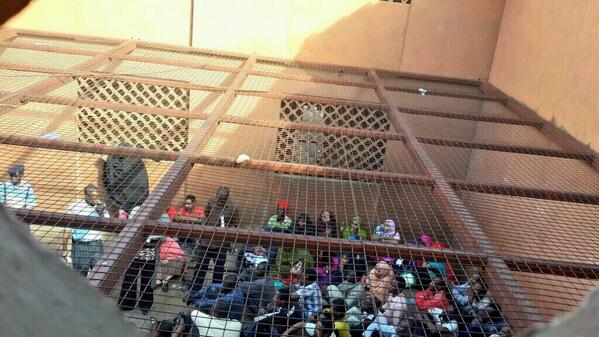18 May 2014 – Kenya’s security has faltered as a series of violent and explosive attacks continue to bring a dark cloud over this beautiful country.
On April 2nd, Operation Usalama Watch was introduced after an explosion took six lives in Eastleigh, a bustling urban neighborhood in Nairobi.
The operation was intended to curb terrorism and nab suspected illegal aliens, who Interior Cabinet Secretary Joseph Ole Lenku has blamed contemptuously for much of the insecurity.
After receiving the green light from security chiefs, police officers and security forces stormed the streets of Eastleigh as though they were gearing up to fight war inside their own country.
They entered homes indiscriminately and asked for legal documents to everyone in sight, including children and the elderly.
It did not matter whether you were a Kenyan of Somali heritage or a Somali refugee with legal papers. If you could not provide legal documents at the time of the search then you were either going to jail or be detained in Kasarani stadium for however long the government wanted to hold you for document verification.
 In social media, many Kenyans documented beatings, harassment, and bribe solicitations as they were occurring–with police reportedly confiscating the IDs of innocent targets in some cases.
In social media, many Kenyans documented beatings, harassment, and bribe solicitations as they were occurring–with police reportedly confiscating the IDs of innocent targets in some cases.
Images and videos of women, children, and the elderly being shuffled into old military lorries by Kenyan security forces went viral on the Internet.
These events raised the question whether the government was trying to implement a security policy that protects every Kenyan regardless of their ethnicity, or rather, punish the entire ethnic Somali community for the actions of rotten few that come from across Kenya’s tribal spectrum.
Growing Xenophobia
Regardless of the government’s intent, the level of xenophobic acts has risen through the roof since the start of Usalama Watch.
What has transpired is confusion, chaos, xenophobic acts, and mistrust between communities and security forces.
Mutuma Mathiu, senior editor at Daily Nation (one of Kenya’s leading newspapers) recently wrote an article titled, “Are we just going to sit around and wait to be blown to bits by terrorists?” about the continued attacks on Kenyan soil.
According to Matuma, every “two-bit Somali has a big dream – to blow us up, knock down our buildings and slaughter our children,” stating Kenya’s security forces should act accordingly and “start shooting.”
You have to wonder–what makes this established individual spew such hated and write in such harsh and reckless tone?
 In addition to the rise in rhetorical assaults, Kenyans of Somali origin have been kicked out of buses and faced discrimination in housing advertisements due to profound racism and scapegoating.
In addition to the rise in rhetorical assaults, Kenyans of Somali origin have been kicked out of buses and faced discrimination in housing advertisements due to profound racism and scapegoating.
A Chat with Odinga
To discuss the aforementioned issues further, I recently met with the former Kenyan Prime Minister and current ODM party leader Raila Odinga, who is in Boston, Massachusetts for a residency program hosted by Boston University’s African Presidential Center.
At the meeting, we discussed the current security operations and possibilities of finding a solution to the crisis. We also talked about the impact of insecurity on the economy, refugees, and the current relationship between Kenya and Somalia.
Mr. Odinga assured me that he stood against ethnic profiling in his country and that he’s “deeply troubled about the unfortunate incidents and how the government has been dealing with the issue.”
According to Mr. Odinga, Kenya needs to shift its current energy and financial resources to address several factors that are causing insecurity.
Corruption, greed, and nepotism are inhibiting intelligence gathering and policing operations and ultimately are creating huge obstacles for Kenya’s path to prosperity.
Kenya is for all Kenyans, and Somalis who call home to one of several refugee camps holding more than 600,000 people are grateful to Kenya for playing host. But this should not give the government the right to mistreat, harass, and torture refugees as they please.
When a country agrees to shelter someone, it is responsible for their safety and well-being while also that of citizens and others in the country.
Remember, “A man who uses force is afraid of reasoning.” ~Kenyan proverb
This piece was authored by Ubayda Sharif, an Independent writer interested in African and Middle Eastern politics. You can follow him on Twitter: @iamubayda


Leave a comment